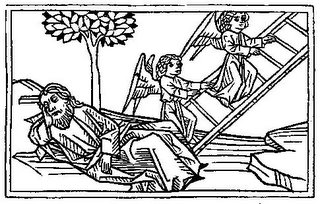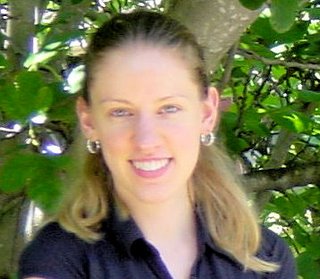Traditional Astrology Books: The Greatest Hits
 --Jacob's Ladder. Clipart collection at godecookery.com.
--Jacob's Ladder. Clipart collection at godecookery.com.I have been asked for the best way to learn tradtional astrology, both with regard to technique and the underlying philosophy. While technique is important, the thought behind traditional astrology is a thousand times more important to master. The difference between the two is like knowing how to read versus knowing why we read and what to read once we learned how. Finally, your understanding of traditional thought will greatly improve your technique. In traditional astrology, the method and the philosophy are one, demonstrating the excellence of the type of astrology which stems from the Spirit, rather than material concerns.
Method:
- Lilly’s Christian Astrology (both volumes); I recommend the edition published by D. Roell of astroamerica.com. Please see my post on How to Read Lilly for additional elucidation.
- Bonatti’s books on horary (there are four currently available from Project Hindsight). Bonatti was an excellent astrologer, and a meticulous (sometimes even pedantic) pedagogue. His books are very clear and easy to understand, though even he had moments when his technique was weaker than we would expect; see last week’s post on Besieging a Castle.
- Al-Biruni. The Arabs were instrumental in combining concepts from eastern (i.e. Indian) astrology and western (Hellenistic) astrology. There was substantial cultural exchange between India and the Arab world, and this is reflected in the astrology passed down to the European medieval world.
Philosophy:
- Mystical Astrology According to Ibn ‘Arabi by Titus Burckhardt. First, I would never recommend reading this book as my first foray into traditional thought. Though slim, it is extremely dense and assumes that the reader already has a solid grasp of traditional thought. Second, the prose itself is not easy to understand; the sentences often run a paragraph long. However, I have put it in first place, as it is such an excellent summary of the intersection between traditional thought and astrology. My recommendation is to read it first and get a passing familiarity with the concepts therein. Then put it aside and read one or more of the books below, after which it is best to revisit this book. Your brain will thank me.
- Advice to the Serious Seeker by James Cutsinger. This is where you should really begin. Cutsinger, a professor and disciple of Frithjof Schuon’s (more on him below) does an excellent job of laying out the esoteric outlines that underlie traditional thought. He also has a few chapters on integrating the tradition into your modern life, a unique and practical approach to living the philosophy (long medieval gowns are not a prerequisite to practicing traditional astrology, in case you were wondering).
- The Essential Frithjof Schuon. Schuon was a renowned exponent of the traditional philosophy. I highly recommend his works in general, as they are a good introduction to many traditional thinkers. The Transcendent Unity of Religions is excellent as well.
- Any of Ibn ‘Arabi’s works. Ibn ‘Arabi is considered a great Islamic thinker. He lived during the 12th century and moved through the Islamic world as an itinerant scholar. He was extremely prolific and put much of his mystical understanding into writing. Though a challenging read, his work goes to the heart of traditional thought like no other. A good start is Ringstones of Wisdom (Fusus al-hikam).
- The Reign of Quantity & the Signs of the Times by Rene Guenon. This book is definitely a must to get the “why” of traditional philosophy and how in heck we got to where we are today. Another top-notch, instructive and slightly less depressing read is Fundamental Symbols (published by Fons Vitae Press (under the Quinta Essentia imprint)).


2 Comments:
Hi Nina,
Thanks for the recommendations. I just got "The essential Schuon" about a week ago and it looks very good. I started browsing through "Mystical astrology" a few hours ago, and you're right, it does look like it will be a "must read" but not necessarily a quick one. I also read the chapter on the decline of the craft tradition in Guenon's "Reign of Quantity..." and it was excellent. Thanks for reminding me to get that book, I am looking forward to reading it in the entirety. Thanks also for the other book recommendations just posted.
Before I forget, I was wondering if you are involved in any way in the registration of the the John Frawley workshop in San Francisco this February. The reason I ask is because your site states that you work in the San Francisco area and I know you were a student of his. If you are not involved, I can always write to him directly. I'm currently in Sacramento, CA, and I would be very interested in attending. I have been considering doing his corresponence course. Maybe it will lighten the passing of my first saturn return!
I look forward to hearing from you.
Respectfully, Peter
Dear Peter,
Thanks very much for your comment; putting together a reading list was helpful to me as well. It forced me to consider my learning arc.
Regarding John's upcoming SF lecture, I'm not organizing it, though I will definitely be there! I will forward you the email (to your hotmail account) from Steve Pincus of NCGR who is the organizer for that lecture.
Finally, I would definitely recommend the horary course. It was a turning point in my own astrological and spiritual learning.
Nina
Post a Comment
<< Home